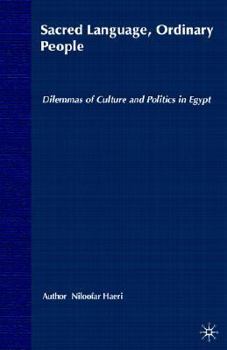Sacred Language, Ordinary People: Dilemmas of Culture and Politics in Egypt
Select Format
Select Condition 
Book Overview
The cultures and politics of nations around the world may be understood (or misunderstood) in any number of ways. For the Arab world, language is the crucial link for a better understanding of both. Classical Arabic is the official language of all Arab states although it is not spoken as a mother tongue by any group of Arabs. As the language of the Qur'an, it is also considered to be sacred. For more than a century and a half, writers and institutions...
Format:Paperback
Language:English
ISBN:0312238975
ISBN13:9780312238971
Release Date:January 2003
Publisher:Palgrave MacMillan
Length:184 Pages
Weight:0.54 lbs.
Dimensions:0.7" x 5.5" x 8.4"
Related Subjects
Anthropology Cultural Foreign Language Foreign Language Dictionaries & Thesauruses Foreign Language Fiction Foreign Language Learning Foreign Language Study Foreign Language Study & Reference Foreign Languages Humanities Literary Criticism Literary Criticism & Collections Politics & Social Sciences Religious Studies Social Science Social Sciences SociologyCustomer Reviews
3 ratings
Christmas present
Published by Thriftbooks.com User , 17 years ago
This book was for the same Egyptology student, who is taking her studies further in Social Anthropology. Makes a good case for a bridge between Ancient Egypt and the culture of today.
Egyptians Speak a Language they do not Respect and Respect a langauge they do not speak
Published by Thriftbooks.com User , 18 years ago
Niloofar Haeri is an Iranian American; she studied Arabic Language in the USA and went to Egypt to further her studies. On arrival she realized that the language she learnt "modern Arabic" is very different from the language spoken by the Egyptians. The difference was more than just accent or dialect; it was far more fundamental than that. Haeri set out studying the Egyptian "Arabic" language in great detail and studying its role in the society. Haeri describes contradictions galore in the way the society deals with the language issue and the way the whole language question is suppressed virtually by the entire nation. Egyptians are trapped unable to develop their language because any such development would be a departure from the sacred language of the Quran; a language the Egyptians never spoke and need to learn. Even the Copts, Egypt's Christians see Egyptian Arabic as an inferior language. Some of the amazing findings of Haeri include her analysis of the language of the newspapers which follows the sentence structure of Egyptian Arabic, political speeches and language on the TV. It was interesting to see how presidential speeches in Egyptian Arabic are often "translated" into proper Arabic for official news purposes. I first heard of this book from a very negative review of the Al Ahram Weekly that was written by an American woman living in Egypt. The negative review was front page of the book review supplement of the Ahram. I was fascinated by it, so on my return to the US I ordered and truly loved it. Outstanding work, very highly recommended!
Spoken Arabic: The Sacred and Profane
Published by Thriftbooks.com User , 19 years ago
This is a very intelligent book about a topic that has been plaguing Arabic philoloigists and thinkers. How do you modernize a language that is considered sacred? Is there a difference between the modern Classic Arabic and the Quran's Classic Arabic? What are people's attitudes towards Classical Arabic? Perhaps one of the best passages in this study is when an Egyptian would explain the ease and the relaxed state of mind he is in upon hearing or reading the Quran (which is written in Classical Arabic), yet at the same time would describe the same language as "diffcult", and a burdan to write and communicate in within other spheres. Other topics explore the efforts made to transfer a sacred language into print and media and how it defines social heirarchies within Egyptian society.





